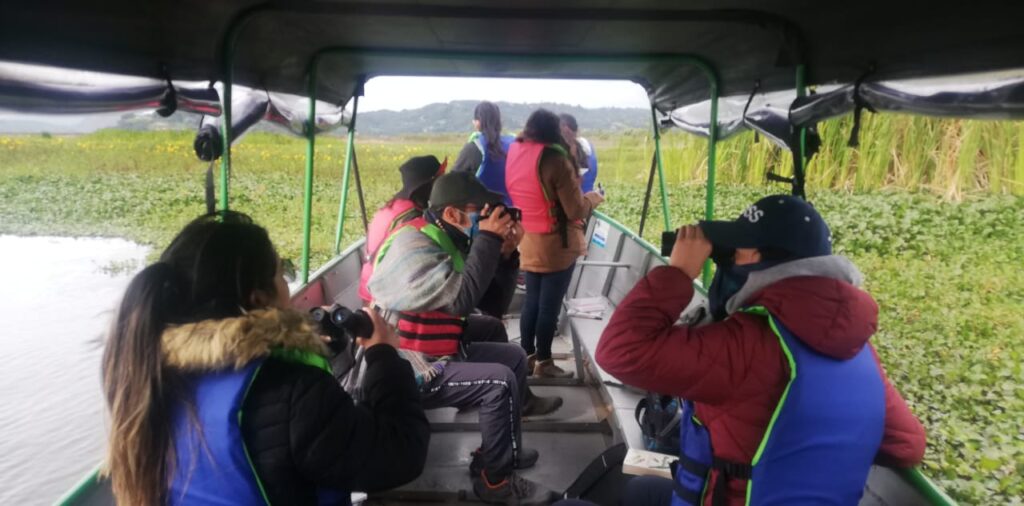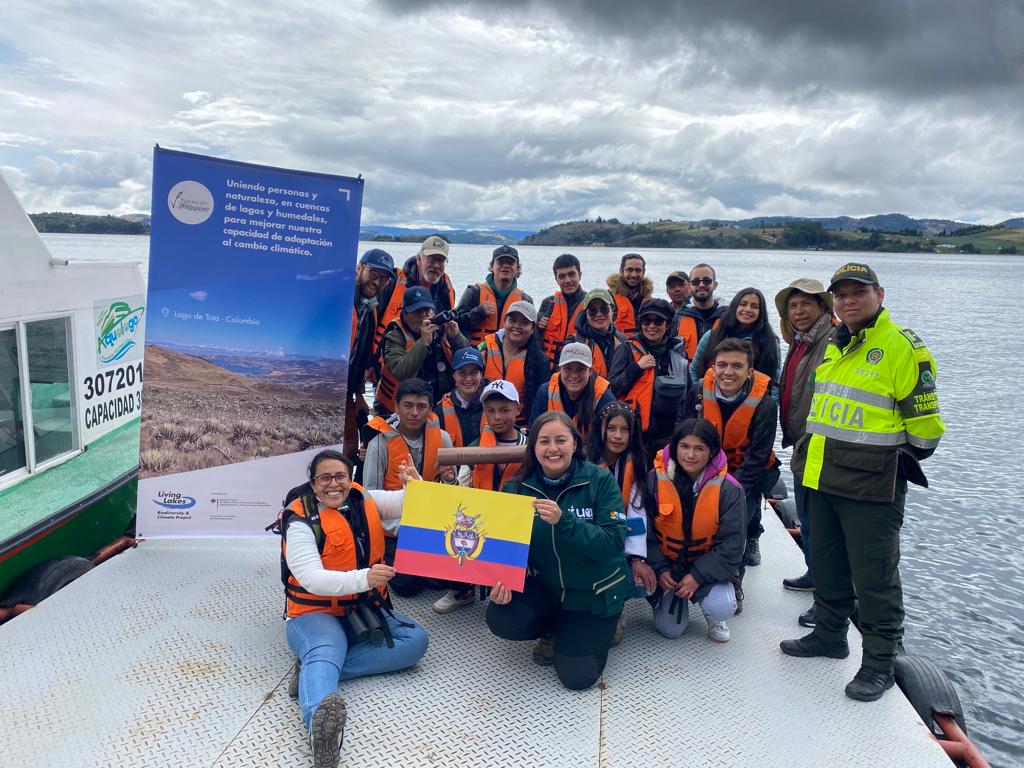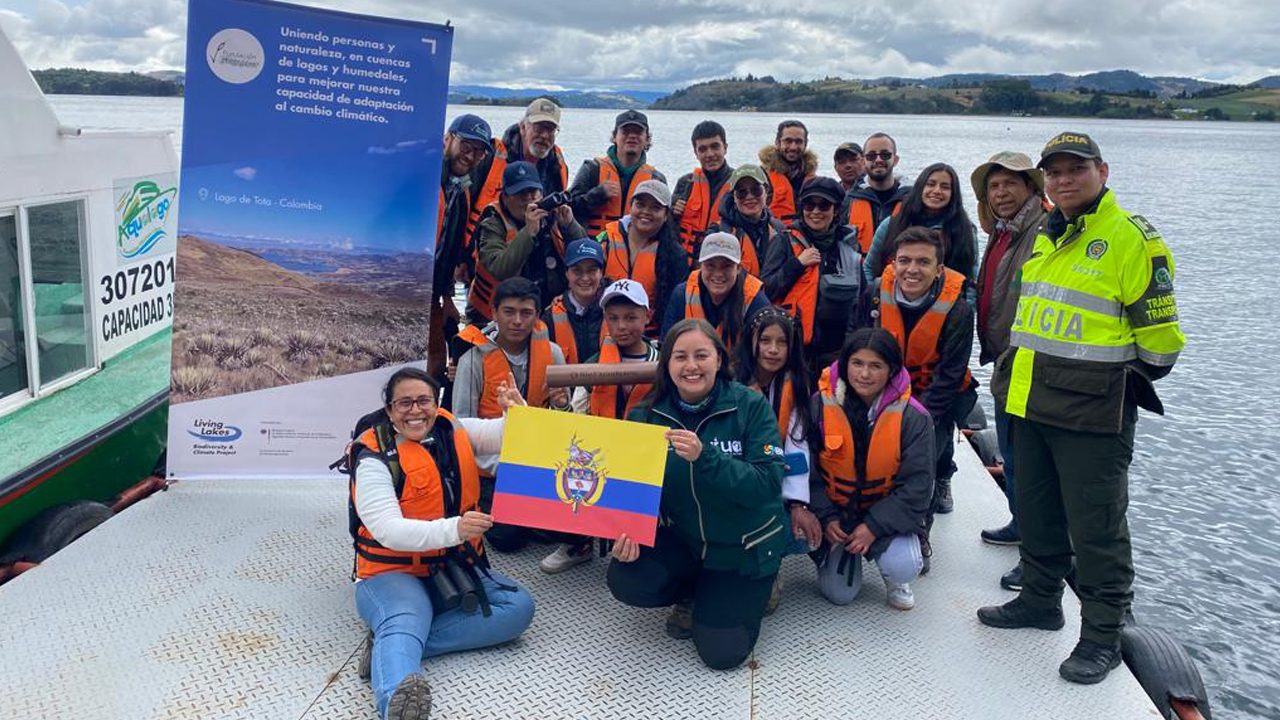Young people and local stakeholders were among the enthusiastic groups of people who took out their cameras and binoculars to enjoy the incredible diversity of birds in the Tota and Fuquene Lakes of Colombia, during this year’s Global Big Day.
Fundación Humedales, alongside the Universidad Pedagógica Nacional and the Red Fenológica de Aves y Turismo (Phenological Network of Birds and Tourism), joined this great celebration on May 13. Both lakes are considered a ‘biodiversity hotspot’ in the region, home to a great number of resident and migratory bird species, and Fundacion Humedales is working to protect and restore them as part of the Living Lakes Biodiversity and Climate Project.
The Global Big Day is a worldwide bird watching event organized every year by the Cornell Lab of Ornithology to live a unique experience of connection with nature. Participants try to spot as many bird species as possible, celebrating their incredible diversity and improving their study and conservation.
According to the South American Classification Committee for Birds, Colombia boasts the greatest diversity of birds in the world. That’s why many people, including beginners and experts, gather in several areas of the country to enjoy this great day of celebration around biodiversity and birds.

Lake Fuquene
The day began very early in Lake Fúquene. A team covered a terrestrial route, while other groups embarked in boats, trying to cover most of the lake. Equipped with cameras and binoculars, they enjoyed the incredible diversity of Fuquene, an Important Bird and Biodiversity Area (IBA) – a total of 48 species belonging to 24 families were recorded, with 1,736 observed individuals.
As one of the last remaining wetlands in this area of the High Andean Plateau, Fúquene is one of the last refuges of endemic species such as the Apolinar’s Wren (Cistothorus apolinari) or the Bogota Rail (Rallus semiplumbeus). Participants were delighted to record both species, and other hightlights were the Least Bittern (Ixobrychus exilis bogotensis), the Yellow-hooded Blackbird (Chrysomus icterocephalus) or the White-tailed Hawk (Geranoaetus albicaudatus).

Lake Tota
The day at Lake Tota was organized to include five bird-watching points: Desaguadero, Rancho Tota, Buena Vista, Vereda Pérez and La Península, allowing the participation of the municipalities of Aquitania, Tota and Cuítiva. Furthermore, aquatic surveys covered a large area of the lake.
The participants were attentive, in the aquatic and terrestrial surveys, trying to record with their lenses the birdlife of this wonderful lake – 46 species belonging to 18 families were observed during the day, with a total of 847 recorded individuals.
Birds such as the Apolinar’s Wren (Cistothorus apolinari), Bogota Rail (Rallus semiplumbeus), Horned Lark (Eremophila alpestris), Silvery-throated Spinetail (Synallaxis subpudica), Cinereous Harrier (Circus cinereus) and other resident birds were recorded. Migratory species from North America as the Blue-winged Teal (Spatula discors), the Sora (Porzana carolina) and the Osprey (Pandion haliaetus) were also present in the Lake.
In addition to the threatened and endemic species shared with Fúquene, such as the Apolinar’s Wren and Bogota Rail, we recorded the Horned Lark. It is a threatened subspecies (Eremophila alpestris peregrina) endemic to this region of the country and associated with bunching onion crops in Tota. Even though the Horned Lark is widely distributed throughout the world, this isolated and differentiated subspecies has very localized and scarce populations, whose ecology and current status are still unknown to science.

Different stakeholders also participated in this citizen science event such as the Secretary of Environment of Bogotá, Mayor’s Office of Fúquene and other local, regional and national entities.
Fundacion Humedales wants to acknowledge the vital role of the Coordinator of the Red Fenológica de Aves y Turismo, Paola Suárez, and the Ornithologists Johana Zuluaga and Daniel Mesa. They all shared their knowledge with the participants and made possible this contribution to the Global Big Day – this year Colombia was, once again, the country with the most bird species recorded during the celebration.
Training the young birdwatchers of Lake Tota
Before the Global Big Day, 40 students from the Institución Educativa de Suse (Aquitania) participated in a workshop where they learnt about the characteristics of the endemic, migratory and vulnerable bird species of the lakes, and the importance of these ecosystems. Knowledge, laughter and anecdotes were exchanged during this great learning experience, welcoming these new champions for their local biodiversity.
Participatory environmental education allows younger generations to learn about the attributes of their territory and to be aware of the bird species present in the lakes and their surroundings. These learning activities foster the leadership and sense of belonging required to face the effects of climate change. The participation of the communities and their capacity to strengthen themselves is critical for successful actions towards climate change adaptation.
Fundacion Humedales will continue to join forces for the conservation of these incredible birds, working to restore the balance and diversity of all life in the basins of Tota and Fuquene Lakes.

